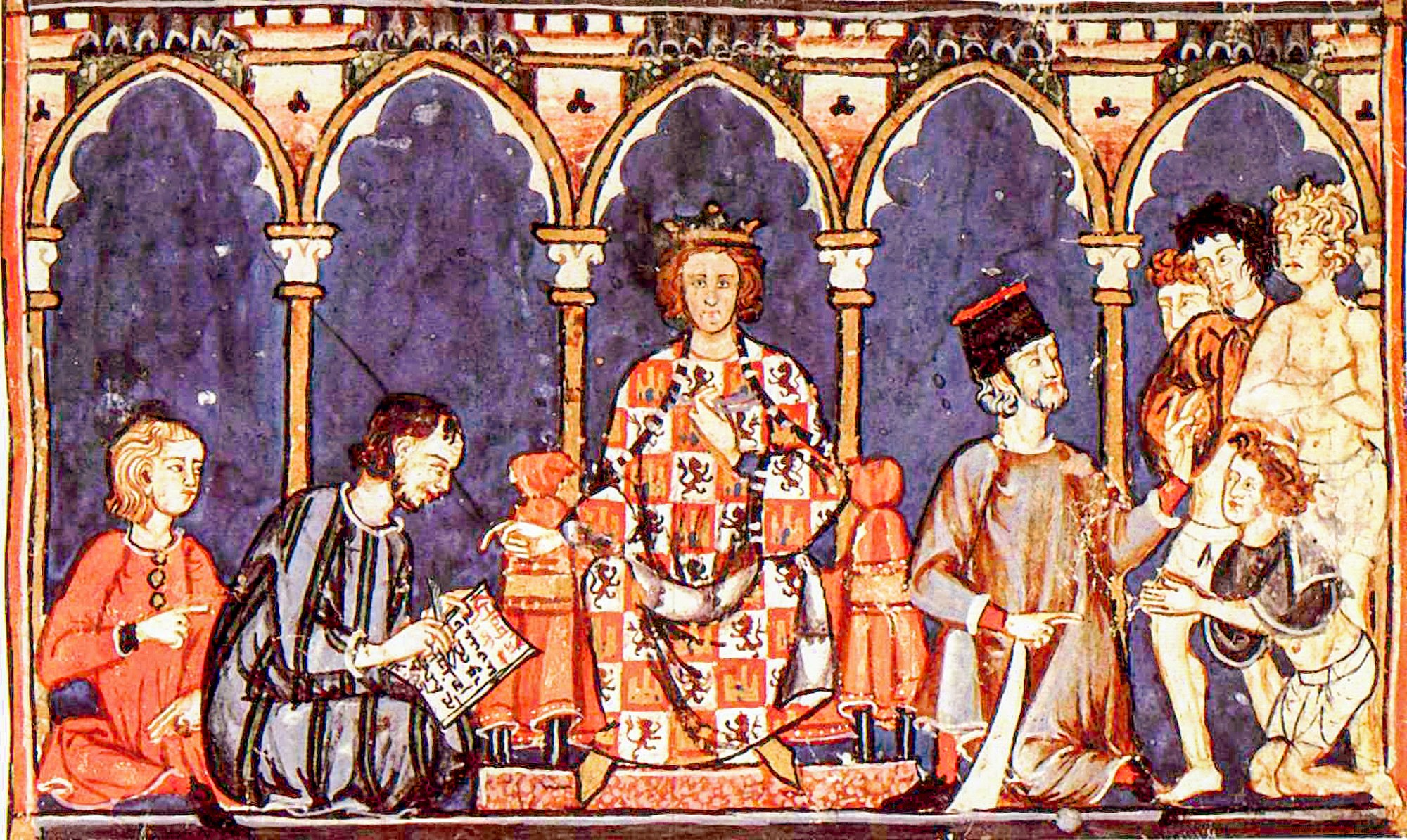Based on Joseph F. O’Callaghan, “Paths to Ruin: The Economic and Financial Policies of Alfonso the Learned”.
Alfonso X of Castile, from his Libro de los Juegos.
King Alfonso X of Castile and León (1221-1284), known to history as Alfonso el Sabio (“the Learned”), reigned from 1252 to 1284 and left behind a legacy that is both brilliant and burdened. On one hand, he was a visionary patron of science, law, and the arts, producing monumental works like the Siete Partidas, the Cantigas de Santa María, and the Libro de los Juegos (Book of Games). On the other hand, as historian Joseph F. O’Callaghan explains in his chapter “Paths to Ruin”, Alfonso’s reign was also marked by a catastrophic failure in financial and economic policy—a failure that weakened the Castilian crown and sowed unrest for decades to come.
A Scholar on the Throne
Alfonso X was not the typical medieval monarch. Fluent in Latin, Arabic, and Castilian, he was as much a scholar as a sovereign. Under his rule, a vibrant court at Toledo became a center of translation and intellectual activity, where Christian, Muslim, and Jewish scholars collaborated. One of the most remarkable products of this atmosphere was the Libro de los Juegos (Book of Games, 1283)—an illustrated treatise on chess, dice, and board games. More than a manual, it is a philosophical and cultural text that blends entertainment, moral education, and cosmology, reflecting Alfonso’s fascination with the interplay of chance, reason, and fate.
But the grandeur of his cultural ambitions stood in sharp contrast to the reality of his kingdom’s finances.
Dreams Too Expensive to Realize
According to O’Callaghan, Alfonso’s intellectual and imperial ambitions demanded money—a lot of it. His bid for the Holy Roman Empire, his extensive codification of law, and his royal patronage of scholarship all drew heavily on the royal treasury. Yet the revenue streams of 13th-century Castile were limited. To make up for the gap, Alfonso relied on aggressive taxation and damaging currency debasement—undermining both the economy and public trust.
He minted increasingly debased coinage, reducing the silver content while maintaining face value. This led to inflation, distrust in the Castilian currency, and a sharp downturn in trade. Even cities that supported the king intellectually and politically began to resist his economic policies.
Political Fallout and Fractured Authority
O’Callaghan emphasizes that Alfonso’s fiscal mismanagement led not only to economic strain, but to political fragmentation. The Cortes (Castile’s representative assembly) grew increasingly critical of the crown. Nobles, clergy, and cities resented rising taxes and the inflationary impact of bad coinage. The king’s authority—already under pressure from his failed imperial ambitions—began to erode.
Most devastatingly, Alfonso’s last years were marked by dynastic conflict, as his son Sancho rose in rebellion, supported by nobles who feared further ruin. Alfonso died in 1284, largely politically isolated, with his legal and cultural legacy overshadowed by the financial chaos he had created.
A Legacy Divided: Culture vs. Collapse
O’Callaghan’s portrait of Alfonso X is not that of a tyrant or a fool, but of a brilliant mind unmoored from financial reality. The very intellectual projects that make Alfonso celebrated today—his codification of law, his Book of Games, his support of science and vernacular literature—were funded through means that ultimately destabilized his kingdom.
In this sense, the title “Paths to Ruin” carries a double meaning: Alfonso walked a path that elevated Castilian culture and law to unprecedented heights, while simultaneously guiding his monarchy into economic and political decline.
Conclusion
Alfonso X remains one of the most paradoxical figures of the Middle Ages. He gave Europe some of its earliest and richest secular literature, codified legal systems still influential today, and preserved the intellectual heritage of three great cultures. Yet, as O’Callaghan’s analysis shows, his financial policies unraveled the very foundations of his state.
He was, perhaps, too learned to rule well—a king who left behind a library of wisdom but a kingdom in crisis.
Further Reading
Joseph F. O’Callaghan, “Paths to Ruin: The Economic and Financial Policies of Alfonso the Learned”, in The Worlds of Alfonso the Learned and James the Conqueror (Princeton, 1985).
Joseph F. O’Callaghan, The Learned King: The Reign of Alfonso X of Castile (University of Pennsylvania Press, 1993).
Joseph F. O’Callaghan, Alfonso X, the Justinian of His Age: Law and Justice in Thirteenth-Century Castile (Cornell University Press, 2019).
H. L. R. Edwards, The Book of Games: Alfonso X’s Book of Chess, Dice and Tables (Dover facsimile edition).

